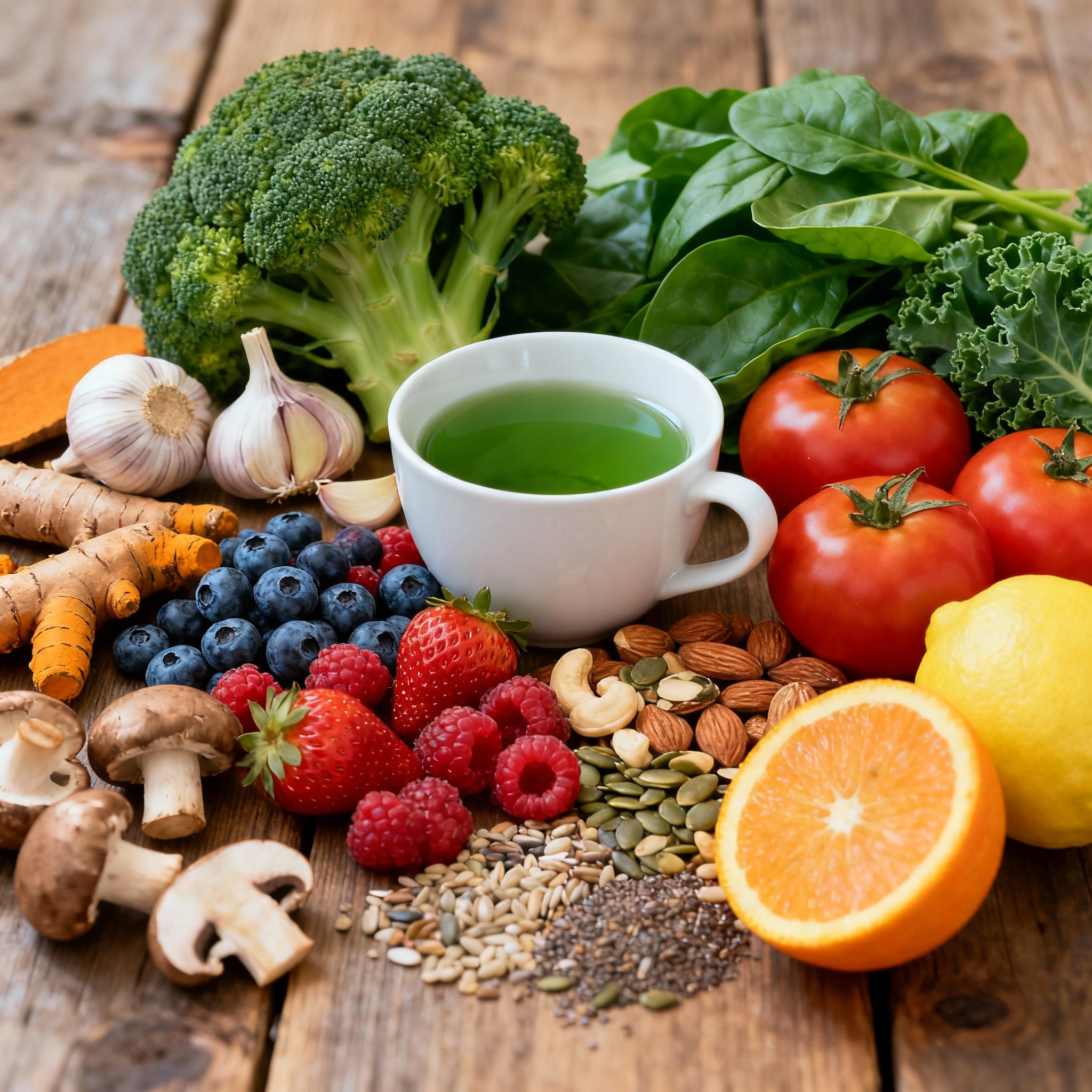Cancer remains one of the leading causes of death worldwide, but emerging research increasingly highlights that diet plays a critical role in reducing cancer risk and supporting overall health. Certain foods contain powerful nutrients and phytochemicals that may help the body combat cancer by reducing inflammation, blocking carcinogens, and boosting immune function. Incorporating these cancer-fighting foods into your regular diet is a delicious and natural way to support your body’s defenses.
Below are the top 10 cancer-fighting foods you should consider eating more often, along with tips for how to enjoy them daily.
1. Broccoli and Cruciferous Vegetables
Broccoli, cauliflower, cabbage, Brussels sprouts, and bok choy belong to the cruciferous family and are stars in cancer prevention diets. They contain unique compounds like sulforaphane and indole-3-carbinol which research suggests may stimulate protective enzymes and inhibit cancer cell growth. Studies link frequent consumption of cruciferous vegetables to a lower risk of lung, breast, colon, and prostate cancers.
To maximize health benefits, try lightly steaming broccoli or roasting cauliflower with a drizzle of olive oil. These veggies also work well sautéed or added raw to salads. Including a variety of cruciferous vegetables regularly can be a tasty shield against cancer development.
2. Garlic
Long valued for its medicinal powers, garlic offers cancer-protective benefits through sulfur-containing compounds such as allicin. Evidence from large studies suggests garlic consumption is associated with reduced risks of stomach, colorectal, esophageal, pancreatic, and breast cancers.
To harness garlic’s powers best, eat it raw or crushed shortly before cooking to preserve allicin. Adding raw minced garlic to salad dressings, dips, and sauces or roasting whole cloves to mellow the flavor makes it easy to include garlic in meals.
3. Berries
Blueberries, strawberries, raspberries, and blackberries are rich in antioxidants known as anthocyanins and ellagic acid. These compounds help neutralize harmful free radicals and may inhibit cancer cell multiplication. Berries may also support DNA repair and have anti-inflammatory effects.
Frozen berries are convenient for smoothies, yogurt, or oatmeal, while fresh berries can be a sweet snack or salad topping. Aim to eat a colorful mix of berries throughout the week for variety and potency.
4. Green Tea
Green tea is a well-researched beverage containing powerful antioxidants called catechins, particularly epigallocatechin-3-gallate (EGCG). These antioxidants help reduce oxidative stress and inflammation and may slow tumor growth in breast, liver, prostate, and colorectal cancers.
For best effect, drink green tea daily—preferably freshly brewed. Avoid excess caffeine by limiting to three cups a day. Add lemon or ginger for flavor and immune support.
5. Turmeric
Turmeric’s yellow pigment, curcumin, is a potent anti-inflammatory and antioxidant that has shown promise in slowing cancer cell proliferation and boosting immune response. Research highlights its potential against breast, colon, prostate, and pancreatic cancers.
Use turmeric liberally in curries, soups, and roasted vegetable dishes. Consuming turmeric with black pepper enhances absorption significantly. Turmeric milk or tea is another soothing way to enjoy this spice.
6. Tomatoes
Tomatoes provide lycopene, an antioxidant that has been linked to a reduced risk of prostate, lung, and stomach cancers. Cooking tomatoes makes lycopene more available for absorption. They also contain vitamins C and A, which support immune health.
Add tomatoes to sauces, soups, stews, salads, or enjoy freshly sliced with olive oil and herbs. Sun-dried tomatoes and tomato juice are great options as well.
7. Leafy Greens
Spinach, kale, arugula, and other dark leafy greens are loaded with fiber, folate, vitamins C, E, and K, plus antioxidants like lutein and zeaxanthin. These nutrients aid detoxification, reduce inflammation, and promote DNA repair, all key in cancer defense.
Add greens to smoothies, salads, omelets, or lightly sauté as a side dish. Diverse preparation methods keep meals interesting and nutrient-dense.
8. Nuts and Seeds
Walnuts, flaxseeds, chia seeds, and almonds contain heart-healthy omega-3 fatty acids, fiber, and lignans—plant compounds with antioxidant and hormone-balancing properties. Regular consumption of nuts and seeds is linked to a lower risk of breast, colon, and prostate cancers.
Snack on a handful of mixed nuts or sprinkle ground flaxseed on cereals, yogurt, or baked goods for increased cancer-fighting benefits.
9. Mushrooms
Certain mushrooms, especially shiitake, maitake, and reishi, contain polysaccharides and beta-glucans that support immune function and may inhibit tumor growth. Mushroom extracts have been studied for their adjunctive role in cancer therapies.
Add mushrooms to stir-fries, soups, pasta, or use dried varieties in stocks and sauces. Their rich umami flavor makes them a great meat substitute.
10. Citrus Fruits
Oranges, lemons, grapefruits, and limes are rich in vitamin C and flavonoids, which protect cells from oxidative damage and modulate inflammation. Some research also suggests citrus intake may reduce the risk of esophageal, stomach, and pancreatic cancers.
Enjoy citrus as fresh fruit, in salads, squeezed over vegetables, or blended into smoothies. Citrus zest is an excellent way to add flavor and phytochemicals to dishes.
How to Incorporate These Foods Daily
Building a cancer-fighting diet can be both simple and delicious when you focus on whole, plant-based foods. Here are some practical tips:
-
Start your day with a smoothie that includes berries, spinach, flaxseed, and a cup of green tea.
-
Add garlic and turmeric to soups, stews, and roasted veggie dishes.
-
Snack on a mix of nuts and fresh fruit.
-
Use tomato-based sauces and include cruciferous veggies in salads and stir-fries.
-
End your meal with a citrus fruit or herbal tea infused with fresh herbs like mint.
Final Thoughts
No single food can guarantee cancer prevention, but a diet rich in these top cancer-fighting foods supports the body’s natural defenses and may reduce your cancer risk. Combining these foods with regular exercise, avoiding tobacco, and maintaining a healthy weight further boosts protection.
These wholesome foods not only nourish but also empower your body’s immune system, reduce inflammation, and help neutralize carcinogens. Enjoy the vibrant variety and flavors while caring for your long-term health.
- https://www.mdanderson.org/cancerwise/36-foods-that-can-help-lower-your-cancer-risk.h00-159774078.html
- https://www.moffitt.org/endeavor/archive/10-cancer-fighting-foods-you-should-be-eating/
- https://www.aicr.org/resources/blog/what-are-the-top-10-cancer-fighting-foods/
- https://www.cancerwellness.org/2025-cancer-fighting-foods-nutritional-guide/
- https://www.americanoncology.com/blogs/ten-foods-that-can-help-in-prevention-of-cancer
- https://www.hkioc.com.hk/en/cancer-prevention-recipes-top-10-anti-cancer-foods/
- https://www.medicalnewstoday.com/articles/324193
- https://www.nationalbreastcancer.org/blog/15-foods-to-keep-stocked-when-facing-cancer/
- https://prolifecancercentre.co.in/10-cancer-fighting-foods-to-add-to-your-diet/






